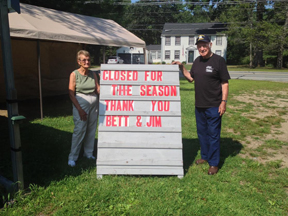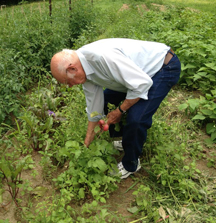July 23, 2014

Photo Nancy Arsenault
By Nancy Arsenault
Jim and Betty Sauta posted their own version of social media a week ago, displaying a simple driveway sign announcing their longtime farm stand was abruptly closing for the season. Both Jim and Betty are stricken with the long term effects of Lyme disease, something the octogenarians never thought could be so debilitating for themselves or for their farm on Hudson Road.
“It was the hardest decision we have ever made,” said Jim, recalling that he and his wife shed many tears over their choice to end what they see as their lifeline to the community; something that has kept them active, strong and healthy beyond their years, up until now.
Back in May, Jim noticed a dark spot on his skin after a day spent tilling the fields, planting and preparing land for the growing season. He pulled it away, and though a lighter spot remained, it turned slightly red by morning and there was no sign of the bulls eye shape often associated with Lyme infection. Within three days, Jim was too weak to get up, had no desire to eat, and was running a 104-degree fever. “I was shaking like a leaf. I don’t even remember the ride to the hospital,” he said.
Blood tests confirmed that the spot was brought on by a tick and while some of the most obvious signs of a bite by a Lyme-carrying tick were not present, doctors determined Sauta was absolutely suffering the effects.
As the growing season progressed and the workload on the farm increased, Jim was recovering and still trying to maintain his crops. “I lost 15 lbs,” said the 85-year old, who has cultivated 1.5 acres for more than two decades.
The Sautas grow vegetables that fill the farm stand from June through September. There is planting, weeding, watering and harvesting to be done every day, along with washing the produce and preparing it for display on the stand. That workload alone is enough to exhaust a healthy, much younger person than Jim. A senior suffering from acute Lyme disease, can find these tasks overwhelming, he said.
But Sauta has been making progress toward recovery and by late June he was feeling more energetic and able to handle some of the farm chores. That is when Betty suffered a bout of pneumonia that severely weakened her, though she continued to work alongside her husband, aided by their son Tom who also lives in Stow. As the pneumonia left her system, a new kind of exhaustion took over. Doctors recently diagnosed Betty as now suffering from a strain of Lyme disease, similar to that of her husband’s, though she has no recollection of a tick bite.
“My blood pressure was down to 50,” she said from under a blanket on a warm afternoon this past weekend. “I said to Jim, we just can’t do it. We have to close the stand. He just looked at me and I asked him which tractor he would be selling first. He said, none of them.” Jim answered, “That’s like asking me which arm I am willing to lose for this. I wouldn’t know what to do without my farm. It’s a Ma and Pa operation, and when Ma and Pa are down, everything collapses,” he admitted, realizing his role is to be caregiver for Betty instead of for the crops.
With moist eyes, Betty said that if it was in her power, she would be out there every day, doing what she has done alongside her husband for years. “But right now I can’t even do the vacuuming,” she said.
Jim said that he has been in touch with the other vegetable farmers in town and offered his growing crops to them, though they must come to

Photo Nancy Arsenault
do the harvesting. Bill Byron, a senior active in the Council on Aging, has been putting in time weeding the rows for the Sautas, a long and hot job, said Betty. The Food Pantry took some of the produce that has come ready, but there is still a season of growing to get through, explained Jim. Earlier this week, some family friends of the Sautas brought a group of middle schoolers to help with the weeding and harvesting. Those vegetables will be distributed to the other farms and to anyone in need. “Everyone is upset that we have closed and ask us where they will get their tomatoes now,” said Jim, with a laugh.
Right now, the field is rich with yellow beans, radishes, beets, zucchini and summer squash, and these two dedicated farmers can only look out back and wonder how this all happened when the season showed such promise. “It’s hard to believe this has knocked us out,” said Betty, who added that they are grateful for all of the meals that have been brought by their home and the calls inquiring of their health.
“We really live in a great place,” said Sauta. “There are a lot of good people, especially among the farmers. We work together. “While doctors are encouraging the Sautas to put their farming days behind them, these two are adamant that that bit of advice is not something they will be following. “We will get through this. And we will be back farming and opening the stand again next season,” said Jim as Betty nodded enthusiastically.